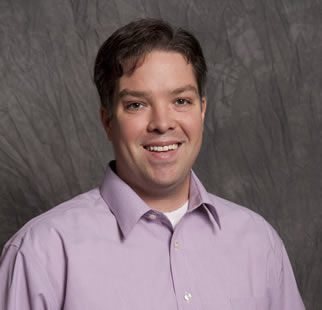Meet a Roadrunner: UTSA Professor Brian Hermann hopes to restore fertility in boys following cancer treatments

Brian Hermann

Brian Hermann
(Feb. 12, 2014) -- Meet Brian Hermann. He, his students and staff are conducting stem cell research that has the potential to impact generations.
Each year, millions of patients undergo chemotherapy and radiation treatments to battle devastating diseases such as cancer. Often, those treatments render the patients infertile, which can shatter their dreams of having children in the future.
While men can preserve their fertility by storing their sperm before harsh treatments and later using those sperm for assisted reproductive technologies, prepubescent boys don't have that option.
In collaboration with researchers at the University of Pittsburgh School of Medicine Magee-Womens Research Institute, Hermann and his collaborators have developed a promising technique to give these patients hope for their future fertility. Their process involves harvesting and transplanting spermatogonial stem cells, the precursors to sperm production. And, it's already proven to work in monkeys.
Hermann and his UTSA students are now working to help move that research forward. They are currently studying ways to improve the transplants so more sperm are produced. Likewise, they're also studying ways to make more spermatogonial stem cells in the petri dish.
"For a long time, oncologists have been unable to address the long-term consequences of life-saving chemotherapy and radiation treatments such as infertility," said Hermann. "That is now beginning to change."
Hermann is among two dozen researchers and business leaders who will share their progress at this week's San Antonio Conference on Stem Cell and Regenerative Medicine, Feb. 13-14. The local conference is a precursor to the 2014 World Summit, the nation's largest stem cell conference, which is slated for San Antonio in December.
------------------------------
Do you know a UTSA researcher whose work has the potential to improve lives? Email us at social@utsa.edu so we can consider your suggestion for our next installment of Meet a Roadrunner.
Events
The UTSA Office of Undergraduate is proud to celebrate National Undergraduate Research with an annual event sponsored by the (OUR) featuring students will showcase undergraduate student research and creative endeavors from all disciplines across campus.
Various LocationsThis community event is hosted by the UTSA Mexican American Studies Program. It is a lecture/performance that examines the contributions of Tejana musicians to the evolution of Mexican American music.
Esperanza Peace & Justice Center, 922 San Pedro Ave.Asian Fanfair is an event that highlights our APIDA (Asian Pacific Islander Desi American) identities on campus. The event will feature performances from our AAPI interest Student Organizations, a tabling fair, and some cultural cuisine.
Student Union Paseo, Main CampusJoin us for a day dedicated to supporting and empowering our UTSA veterans! We're excited to announce our upcoming resource fair, designed specifically to ensure that our veteran students have access to the resources and networking opportunities they need to thrive in their academic and post-military lives.
Student Union Lawn, Main CampusThis workshop will introduce participants to the basics of text analysis using Python and Jupyter Notebook on the Constellate Lab platform. We will create datasets in Constellate to analyze patterns, trends, and relationships of contents and more.
John Peace Library (JPL 3.02.32), Main CampusWhat would award-winning writing professor Diane Abdo say if it were her last lecture? Join us for our annual Last Lecture series on Wednesday April 17.
Multipurpose Room (BSE 2.102), Main CampusDía en la Sombrilla, formerly Fiesta UTSA, is a festival hosted each spring as a part of Fiesta® San Antonio events. Sponsored by Roadrunner Productions, the event features music, food, confetti, games, event t-shirts, and more.
Sombrilla Plaza and Central Plaza, Main Campus

